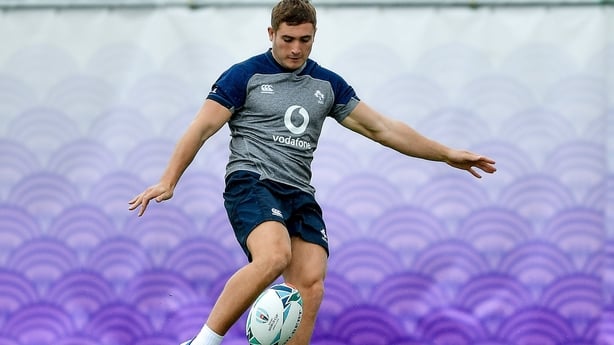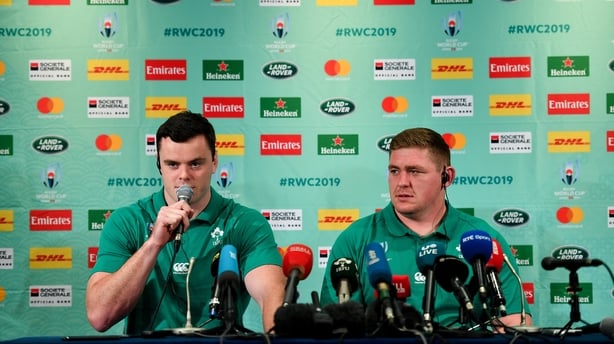It's now four years since Ireland got dumped out of the 2015 World Cup by a rampant Argentina side in a crushing Cardiff quarter-final.
The bulk of Joe Schmidt's work since has been about this trip to Japan and putting that wrong right.
It's been a long time coming.
Infamously, Ireland have never been past a World Cup quarter-final in eight attempts.
The talk of winning the World Cup, which peaked post victory over New Zealand 11 months, has waned and the thoughts of facing South Africa or New Zealand have had a sobering effect, thankfully.
Gameday in Japan. Huge numbers of Irish fans around Yokohama. Looks like they'll hugely outnumber the Scots. Warm and humid but no rain yet #IREvSCO #RWC2019 pic.twitter.com/yisDOy1eAH
— Paul O'Flynn (@OFlynnPaul) September 22, 2019
Ireland's meetings with their tier 1 rivals in the last two World Cups has generally been about earning an 'easier' quarter-final.
Wales in 2011, and the Pumas in 2015, had a good laugh at that notion.
That’s why the game against Scotland has a surreal feel to it.
The All Blacks' win over the Springboks has practically guaranteed top spot in Pool B.
There is currently so little between those two southern hemisphere powerhouses, who have won the competition five times between them, that to argue the benefits of facing one over the other is a tricky proposition.
The choice is between a team that runs a game plan not dissimilar to how England and Wales dismissed Ireland in the Six Nations, and the back-to-back World Champions. Talk about a rock and a hard place.

If something was to be gleaned from the Irish camp about preferred opponents, Schmidt was clearly unhappy with Felix Jones, who had been part of the Ireland coaching set-up for two Tests against Japan in 2017, setting up shop with Rassie Erasmus’s squad just prior to the tournament.
"He was with us," Schmidt told RTÉ Sport a day after having a "long chat" with the former full-back.
"He’s seen everything that we deliver and would have a great knowledge of even the language we use in our camp, so it’s awkward for us."
New Zealand may not be the vintage of 2015 but they are still New Zealand.
"This is not your typical Irish surroundings" - The wait is almost over. Watch Ireland v Scotland tomorrow morning on @RTE2 and @RTEplayer from 8am with @daireobrien15 Eddie O'Sullivan, @jamieheaslip & @StephenFerris6 #RWC2019 pic.twitter.com/MxWEWHi6PF
— RTÉ Sport (@RTEsport) September 21, 2019
This morning's game can be a tone-setter but the fact that Jean Kleyn and Chris Farrell travelled, and that Robbie Henshaw remains in the squad while nursing an injury suggests that the quarter-final battle plays on the head coach's mind.
The game on 19/20 October will be definitive game of Schmidt's tenure.
"I wouldn't often speak in black and white terms over what success looks like, but we know the only way that we can be successful is to get past that quarter-finals," Schmidt, who steps down as boss after the tournament, said.
We need your consent to load this Facebook contentWe use Facebook to manage extra content that can set cookies on your device and collect data about your activity. Please review their details and accept them to load the content.Manage Preferences
But first Ireland must deal with the Scots.
And the problem with Scotland is that while you can usually depend on them to turn up and take their beating, you can't always depend on them.
It's almost two and a half years since the draw that placed the Scotland in Ireland's pool.
That news was greeted by Jamie Heaslip,at that point still a member of the squad, punching the air in delight at a commercial event.
"I remember watching it and thinking, 'yes we're all happy but let's not show our happiness'," Brian O’Driscoll told RTÉ Sport about that moment.
"Jamie was injured at the time and there were questions marks as to whether he was going to be coming back even then.
"It holds less credence because Jamie's not part of the squad. If he was in there now, you'd be sure Gregor Townsend would be getting Ryan Wilson to have a word with him in the first couple of minutes of the game."
Still, it’s hard to reason that some Scotland players won’t be using the fact that a then-team member so publicly revealed his feelings about the opposition.
What else could Townsend use in his pre-match speech?

Eddie O’Sullivan reckons the fact that Schmidt says Rob Kearney and Keith Earls could play if the game had more import could also provide motivation.
Yes, Ireland generally win if the teams play to form but in terms of stirring up Braveheart passion, it doesn’t help.
The recent tale of the tape is in Ireland’s favour with five wins from the last six competitive games, but on the occasions when Scotland did upset the odds, namely 2010, 2013, 2017, the pre-game narrative was eerily familiar: that if both teams turn up, Ireland will shade it.
Being slightly off against Scotland has always been a recipe for trouble.
But even the 2018 win, on the Grand Slam trail, can be instructive to the their threat.
Ireland's opening try came from a Jacob Stockdale intercept and a few minutes later Huw Jones blew a two-on-one that would have put the Scots ahead.
And this year’s game, a 22-13 win for Ireland, was another that easily could have gone the other way.
Scotland lost Stuart Hogg early on in murky circumstances, while the hosts gifted Conor Murray the opening try. Ireland’s defence survived a four-minute siege of their own line just before the break.
It has never been easy going.
"You only get one shot at the first game and then you get control of the pool," said Schmidt.
Ahead of Ireland's World Cup opener with Scotland, Siobhan Ryan takes a look at the likely weather conditions and there's good news, with Yokohama set to avoid the worst of a tropical storm. Probably still not the weather for white boots though. #rterugby #RWC19 pic.twitter.com/EDwT9cy4y5
— RTÉ Rugby (@RTErugby) September 20, 2019
Defeat to Scotland would be more damaging in mental terms as it would bolster the theory that the true Ireland is closer to the 2019 version than the 2018 one. Perish the thought.
In the absence of Kearney and Earls the sides’ backlines (Ireland 254 caps, Scotland 311) are fairly evenly matched, while having the power and talent of James Ryan in the second row cannot be underestimated.
Townsend will hope for a fast and loose game where smart-line runners Finn Russell and Hogg can utilise their strengths.
James Ryan said: "They've gone for Finn Russell at 10, combine that with the threats they have in the outside back area - Stuart Hogg, Tommy Seymour, Darcy Graham and Sean Maitland - they are some of the quickest, rapid guys in world rugby.
"When you put those two together, they are seriously potent side."
Eleven of Scotland's last 13 tries have come from their backline, a stat that tells its own story.
Ireland's pack can edge the forward battle, which has generally been a decent stepping stone for the victories Schmidt's side have earned over the last six years.
A lot will depend on the weather with the general consensus that should the heavens open it would be Scotland's game plan that would be more severely affected. As it stands Yokohama is set to escape the worst.
This is a game that Ireland can actually afford to lose (and still qualify) and at the same time not afford to lose (confidence).
The squad has already taken enough heavy blows between the Six Nations defeats and the friendly in Twickenham last month.
Another one in Yokohama could be fatal.
Verdict: Ireland
Ireland: Jordan Larmour, Andrew Conway, Garry Ringrose, Bundee Aki, Jacob Stockdale, Jonathan Sexton, Conor Murray; Cian Healy, Rory Best (capt), Tadhg Furlong, James Ryan, Iain Henderson, Peter O'Mahony, Josh van der Flier, CJ Stander.
Replacements: Niall Scannell, Dave Kilcoyne Andrew Porter, Tadhg Beirne, Jack Conan, Luke McGrath, Jack Carty, Chris Farrell.
Scotland: Stuart Hogg, Tommy Seymour, Duncan Taylor, Sam Johnson, Sean Maitland, Finn Russell, Greig Laidlaw; Allan Dell, Stuart McInally, (capt), Willem Nel, Grant Gilchrist, Jonny Gray, John Barclay, Hamish Watson, Ryan Wilson.
Replacements: Fraser Brown, Gordon Reid, Simon Berghan, Scott Cummings, Blade Thomson, Ali Price, Chris Harris, Darcy Graham.
Referee: Wayne Barnes
Listen to the RTÉ Rugby podcast on Apple Podcasts, Soundcloud, Spotify or wherever you get your podcasts.
Follow Ireland v Scotland on Sunday (kick-off 8.45am) via the live blog on RTÉ.ie/Sport and the News Now App, watch live on RTÉ2 from 8am or listen to live match commentary on RTÉ Radio 1.


